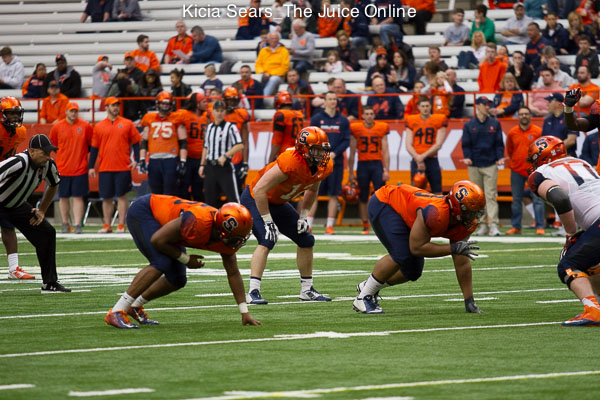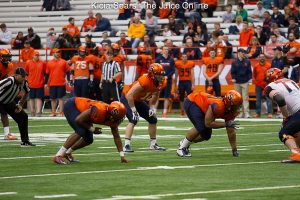

Item: Stretching nearly four hours (3:50) last Saturday, Syracuse’s 30-23 loss to Middle Tennessee State was made worse by the long, drawn out pace of the game from kickoff to final whistle.
We’ve been saying this for years. The powers that be regulating NCAA football rules need to again turn their attention to the ever-expanding time length of the games. It’s hard to expect fans from allocating almost four hours of their Saturday (or Friday night) to sit inside the stadium, let alone hours more to get to the venue, tailgating if that’s their prerogative, and then heading home.
Some folks we talked to that were in attendance at the Dome last weekend became understandably increasingly impatient with all the time stoppages whether it be for the requisite TV commercial breaks and three timeouts allotted to each team per half, the expected 20 minute halftime to allow the band to perform, several video replays to confirm (or not) calls made on the field, seemingly more and more injury timeouts (or in the case of the Blue Raiders a fake injury) as the hard hitting by increasingly bigger and faster players takes its toll, and, of course, the amount of game scoring.
According to a story from August on Jacksonville.com, the average FBS game last season was 16 minutes longer than a NFL game, lasting 3 hours and 24 minutes, which also happens to be exactly what the ‘Cuse averaged in game time last year (Texas Tech, with its high octane offense, averaged a whopping 3:48 last season tops among Power 5 schools).
» Related: Former Syracuse coach Scott Shafer calls return ‘bittersweet’
The NFL has a quicker 13 minute halftime, but at least beginning this season in FBS games the clock starts to count down from the 20:00 mark as soon as the second quarter ends, as opposed to waiting for the field to be cleared for the halftime entertainment, saving a couple of minutes while head coaches are being interviewed on the field by TV and/or radio crews.
That halftime alteration, along with the officials taking over the re-start of the game/play clock with 0:30 left in a TV timeout, is a step in the right direction in managing a game’s pace, but so far SU is averaging 3:34 in its two games, 10 minutes more than last season which was the sixth shortest of the 14 ACC teams.
Unless there are changes to the rules we don’t see that average getting smaller. The easiest fixes to help shave minutes off a game’s duration would be not to stop the clock to move the chains on a first down like in the NFL (but as a compromise perhaps stop it in the final 2:00 of each half), and to re-start the clock immediately after the ball is spotted on an incomplete pass.
Those elements have been discussed according to ACC coordinator of football officiating, and Syracuse-area resident, Dennis Hennigan, but the rules committee preferred to first see the results of changes to the game’s administration as opposed to outright changes to the rules.
It will be interesting to keep an eye on the time-of-day clock in the final 10 games to see if the hoped-for “faster” pace of play by the Orange reduces how long it takes to complete the outcome.
For more Syracuse coverage, Like our Facebook page and follow us @TheJuiceOnline.

